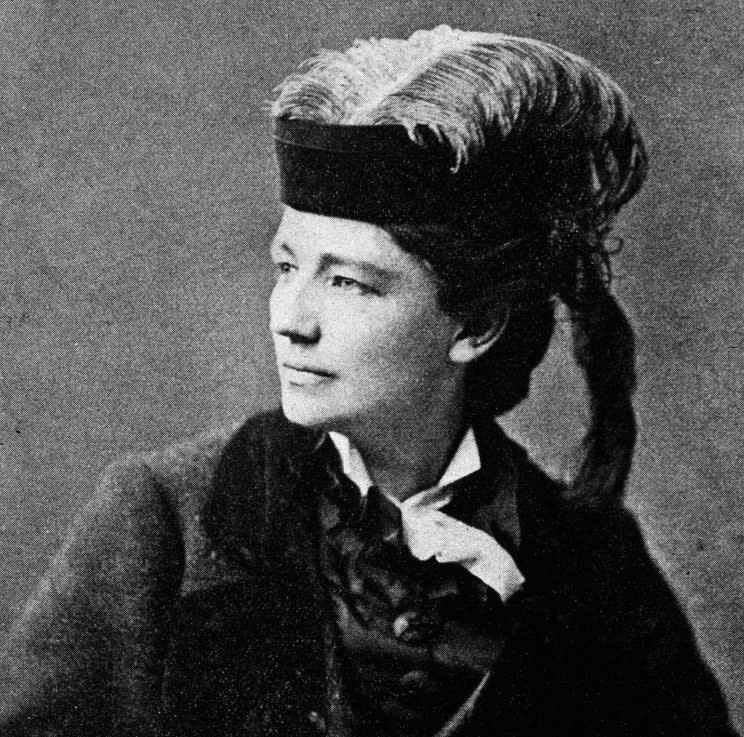Meet Victoria Woodhull, the first woman to run for president

“Tonight’s victory is not about one person. It belongs to generations of women and men who struggled and sacrificed and made this moment possible,” Hillary Clinton said on Tuesday night after winning the New Jersey Democratic presidential primary, solidifying her status as the party’s presumptive nominee.
Clinton spoke beneath a literal glass ceiling in the Brooklyn Navy Yard to a crowd of excited fans, but, referring to her 2008 concession speech, she promised not to shatter it — just the metaphorical one.
Presumably, this is the first time that a woman has ever been the nominee of a major political party. However, it is not the first time that a woman has made a crack in the once-impenetrable glass ceiling by running for president of the U.S.
In 1872, 136 years before Clinton would make her first run for the oval office in 2008, Victoria Woodhull ran for president on the ticket of the Equal Rights Party. Woodhull called for reform on all levels of government and championed equal rights for women, including suffrage.
Strengthening her campaign, Woodhull selected Frederick Douglass — an abolitionist, former slave and prolific writer — to be her running mate.
Though Douglass technically had the right to vote under the 15th Amendment of 1870, Woodhull did not. Women’s suffrage would not be realized for some 50 years, as the 19th Amendment was not ratified until 1920.
Woodhull — who died 89 years ago today on June 9, 1927, at the age of 88 — was not known for conforming to conventions of society. She boldly went where no woman had before — namely, the campaign trail for the U.S. presidency — despite being technically ineligible. Woodhull was 34 years old, and would not meet the minimum age of 35 by the time of presidential inauguration.
Woodhull was an unequivocal underdog, as she was often written off by men because of her gender. Moreover, her running mate was unwilling to participate in campaign effort. Douglass actively supported her opponent, Republican Ulysses S. Grant, giving stump speeches on his behalf.
Woodhull’s legal ineligibility to vote made no difference on election day. The day ballots were cast, Woodhull was in the middle of a month-long incarceration on obscenity charges Politico reported.
Despite the leaps and bounds Woodhull made on behalf of women in the U.S. and internationally, her name and legacy are largely unknown. This is because, in part, she earned zero electoral votes.
Woodhull’s eccentric personal life also contributed to her erasure from history: She was married three times, had made something of a career as a clairvoyant and fortune teller and had drifter parents.
However, contemporary feminists are working to keep her legacy alive by creating a homage Twitter in her name.
@TheWoodhull tweets about her political agenda and provides commentary on current events — and has even endorsed Clinton for the presidency.
To fix corruption in Govt, when I ran for Pres I proposed a 1-term Presidency with lifetime service in Senate following. #books #politics
— VIctoria Woodhull (@TheWoodhull) January 30, 2016
I was too many years ahead of my era. Still, I put some cracks in that giant glass ceiling above women. THE COMING WOMAN #books #women
— VIctoria Woodhull (@TheWoodhull) September 3, 2015
I was fighting for this way back in the 1870s! https://t.co/SBRp0YGY2O
— VIctoria Woodhull (@TheWoodhull) February 17, 2016
I was 1st wm to run for Pres. (1872). Hillary is 1st nom'd by major party! HISTORIC. YAY. https://t.co/ZhSiWrycWM #womanpresident
— VIctoria Woodhull (@TheWoodhull) June 8, 2016
Though Woodhull’s campaign was ill fated, its core message still reverberates today: Women can do anything men can.
Clinton is standing on the precipice of history, poised to finally shatter the ceiling that has loomed over women for centuries, but it is important to remember that all this would not be possible had Woodhull not made that first crack more than 100 years ago.

